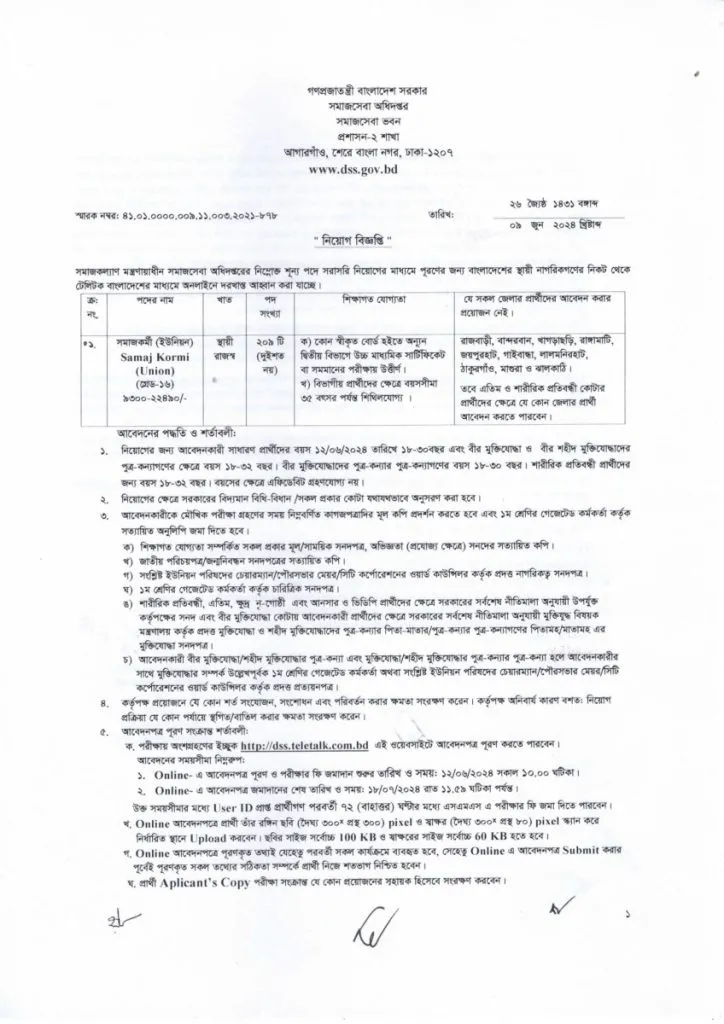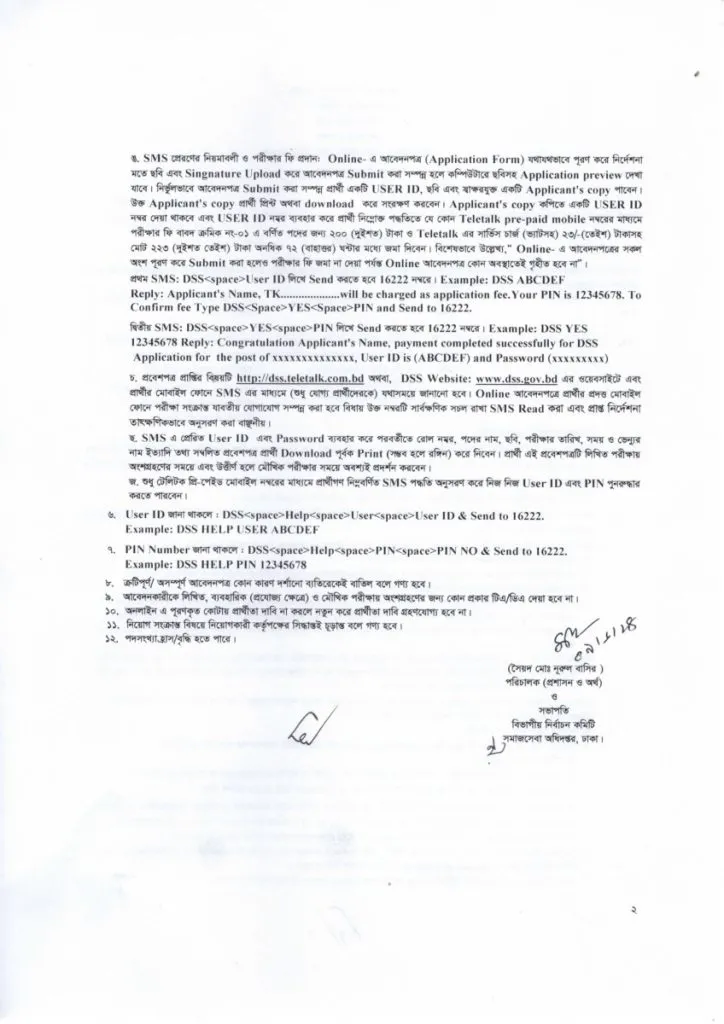Department of Social Services Jobs Circular 2024
DSS job circular 2024: Manpower will be appointed to the vacant posts of the Department of Social Services under the Ministry of Social Welfare. Department of Social Services will appoint a total of 209 people for 01 posts. Interested candidates can apply online. Both men and women can apply for the posts. If interested and qualified you can also apply. Complete notification (DSS job circular 2024) is given in detail.
Post Name: Social Worker (Union)
Number of Posts: 209
Educational Qualification: HSC Pass.
Pay Scale: 9,300 – 22,490 Tk.
Application StartTime: 12th June 2024 from 10:00 AM onwards.
Application Deadline:18 July 2024 at 11:59 PM.
ApplicationProcess:Apply online through http://dss.teletalk.com.bd website and send application form online. The examination fee should be submitted through SMS on mobile within 72 hours from the time of submission of online application.
Ministry of Land Job Circular 2024
See detailed notification…


Department of Social Services
The Department of Social Services (DSS) in Bangladesh is a key governmental body under the Ministry of Social Welfare, dedicated to promoting social well-being and supporting vulnerable groups within the country. Its mission encompasses a wide array of social welfare programs aimed at alleviating poverty, providing care for the disadvantaged, and ensuring social protection for all citizens.
Historical Background
The DSS was established in 1961 with the primary goal of addressing various social issues, particularly those affecting marginalized communities. Over the years, it has evolved significantly, expanding its scope and services to meet the growing and changing needs of the population.
Core Functions and Programs
The DSS operates a variety of programs that cater to different segments of society, including:
- Social Safety Nets:
- Old Age Allowance: Financial support for senior citizens to ensure their economic security.
- Widow Allowance: Assistance for widows to support their livelihoods and reduce economic vulnerability.
- Disability Allowance: Financial aid for individuals with disabilities to promote their social inclusion and independence.
- Child Welfare:
- Orphanages and Child Care Institutions: Providing shelter, education, and care for orphaned and abandoned children.
- Child Protection Services: Initiatives to prevent child abuse, exploitation, and trafficking.
- Women Empowerment:
- Skill Development Programs: Training and capacity-building activities aimed at enhancing the economic independence of women.
- Microfinance and Small Enterprise Support: Financial services to support women’s entrepreneurship and self-employment.
- Disability Services:
- Rehabilitation Centers: Facilities offering medical, psychological, and vocational rehabilitation for people with disabilities.
- Inclusive Education Programs: Promoting access to education for children with disabilities.
- Community Development:
- Poverty Alleviation Programs: Various initiatives aimed at reducing poverty and improving living standards in impoverished communities.
- Rural Social Services: Programs focused on enhancing the social and economic conditions of rural areas.
Organizational Structure
The DSS operates through a decentralized structure with offices at the national, divisional, district, and upazila (sub-district) levels. This enables the department to effectively reach and serve communities across the country. The central office in Dhaka oversees policy formulation, program development, and coordination, while regional offices are responsible for implementation and monitoring.
Challenges and Future Directions
The DSS faces several challenges, including limited resources, capacity constraints, and the need for better coordination among various stakeholders. Despite these challenges, the department is continually striving to enhance its services and reach more beneficiaries. Future directions for the DSS include:
- Strengthening Partnerships: Collaborating with NGOs, international organizations, and the private sector to enhance service delivery and resource mobilization.
- Technological Integration: Utilizing digital technologies to improve efficiency, transparency, and accessibility of social services.
- Policy Reforms: Advocating for policy changes that promote social justice, equity, and inclusion.
Conclusion
The Department of Social Services in Bangladesh plays a vital role in fostering social welfare and supporting vulnerable populations. Through its wide range of programs and initiatives, the DSS aims to create a more inclusive and equitable society. Continued efforts to overcome challenges and implement innovative solutions are crucial for the department to effectively fulfill its mission and improve the lives of those it serves.
